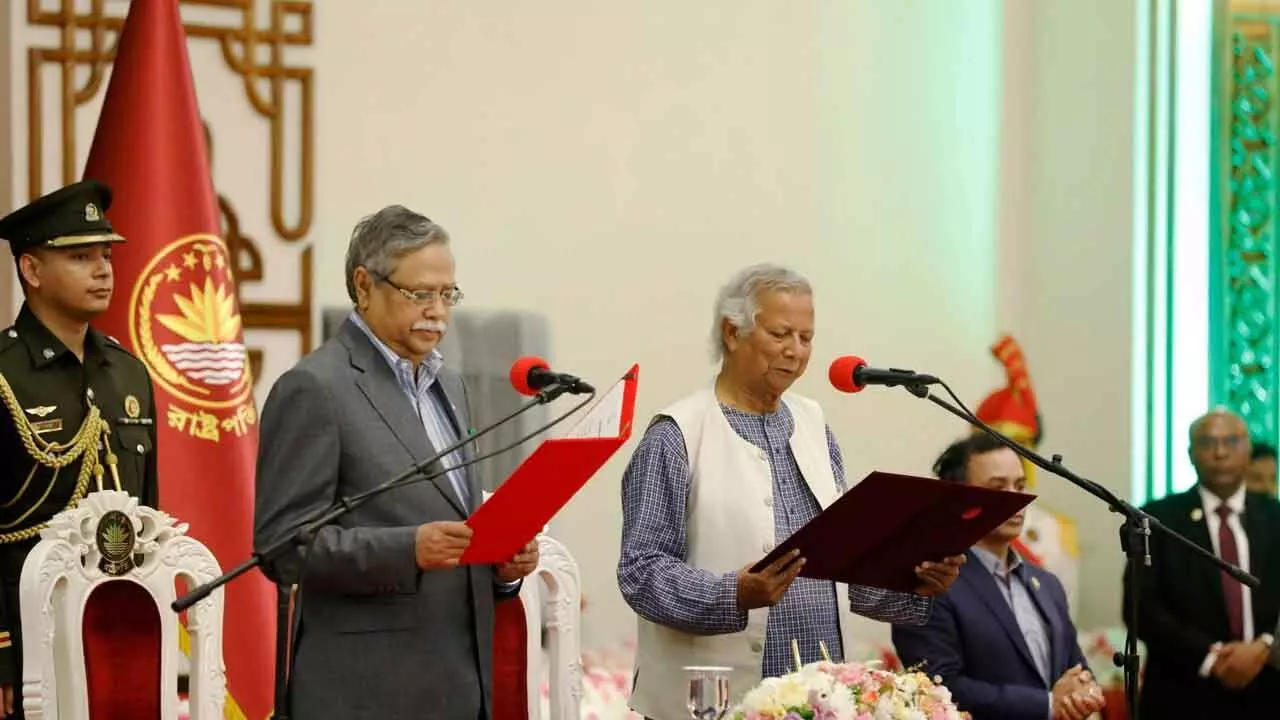Yunus govt a test for India-Bangla relations
Yunus govt a test for India-Bangla relations

Disturbing pictures have been pouring in almost relentlessly from the Bangladesh, arguably India’s mostly friendly neighbours. The most disturbing amongst them, from the India’s point of view, is the anti-India posters, slogan shouting and statements from the so-called student protesters and agitators. Amidst all these, an interim government headed by Nobel Laureate Md Yusuf, is likely to e sworn in on Thursday itself, at a time when the ousted Prime Minister of Bangladesh, Sk Hasina, who had once put the founder of Gramin Bank and Gramin Telecom, behind the bars for violating laour laws, is in India, in political asylum. And few initial statements coming from Prof Yunus, while being politically correct in the current context of that country, are not at all comforting for India. He in fact criticised India’s role in the wake of the students movement in his country and went on to say that India had all along tried to remain a true and close friend of Sk Hasina only, instead of being a friend of Bangladesh.
India, therefore, will have to be extremely cautious and take her steps extremely carefully, in maintaining friendship with the Yunus-led government and at the same time not being unfriendly to Hasina. While fate of the ten pacts signed with much fanfare and hypes, between Hasina and Modi soon after the Modi 3.0 government assumed office only a couple of months ago, hangs in balance in now, India cannot afford to derail the on-going negotiations on the Comprehensive Economic Partnership Agreement (CEPA) between the two countries. Bangladesh cannot afford to do that either.
The ball will in fact be in the court of the new government of the Bangladesh. Mind you that it was not too long ago, India had exported 50,000 tonne of onions to Bangladesh, an making an exception to the export ban on the crop in December 2023. This is apart from essential commodities such as garlic, coconut oil and spices. There have also been instances of informal trade between the two countries, crucial in stabilising inflation in Bangladesh.
Consider some statistics from the World Bank. Facts and figures from the World Bank suggest that Indian exports to Bangladesh were valued around $324 million in 1991. This, interestingly, increased to $868 million in 1996 during the first tenure of BNP. Similarly during its second tenure, in 2001, the export from India was around $1.06 billion, which increased to $1.66 billion in 2006. So advocates and proponents of ‘boycott Indian products’, themselves, had depended heavily on Indian goods and products during their own tenure.
There is no doubt whatsoever that a close economic partnership between India and Bangladesh has been one of the factors behind Bangladesh’s prosperity. India’s geographical proximity to Bangladesh translates into a natural trade advantage. Mind you that the shared land borders and well-established transportation links facilitate the movement of goods, often at lower costs compared to imports from more distant locations like China. It is not without reasons that India is Bangladesh’s second-largest import source, with a staggering $13.69 billion worth of goods entering the Bangladeshi market in 2021-22.
Who doesn’t know that the garment manufacturing industry is one of the key drivers of Bangladesh’ economic growth. And basic raw materials and intermediate goods for this industry - raw cotton, cotton yarns- come from India. It is only after these goods enter into Bangladesh, manufacturers start converting them into fabric and readymade garments at their factories in that country, which are then used for domestic consumption and exports. Besides, refined petroleum, which is crucial for powering any industry and transportation, pharmaceuticals, chemicals, various machineries- all go from India.
Without diesel locomotives, double and single-decker buses, steel coaches, highway duty trucks having been supplied from India, the loss making transportation sector, particularly the Bangladesh Road Transport Corporation (BRTC) would not have come out of the red and seen profits. And who knows all these better than Prof Yunus, an astute economist?

